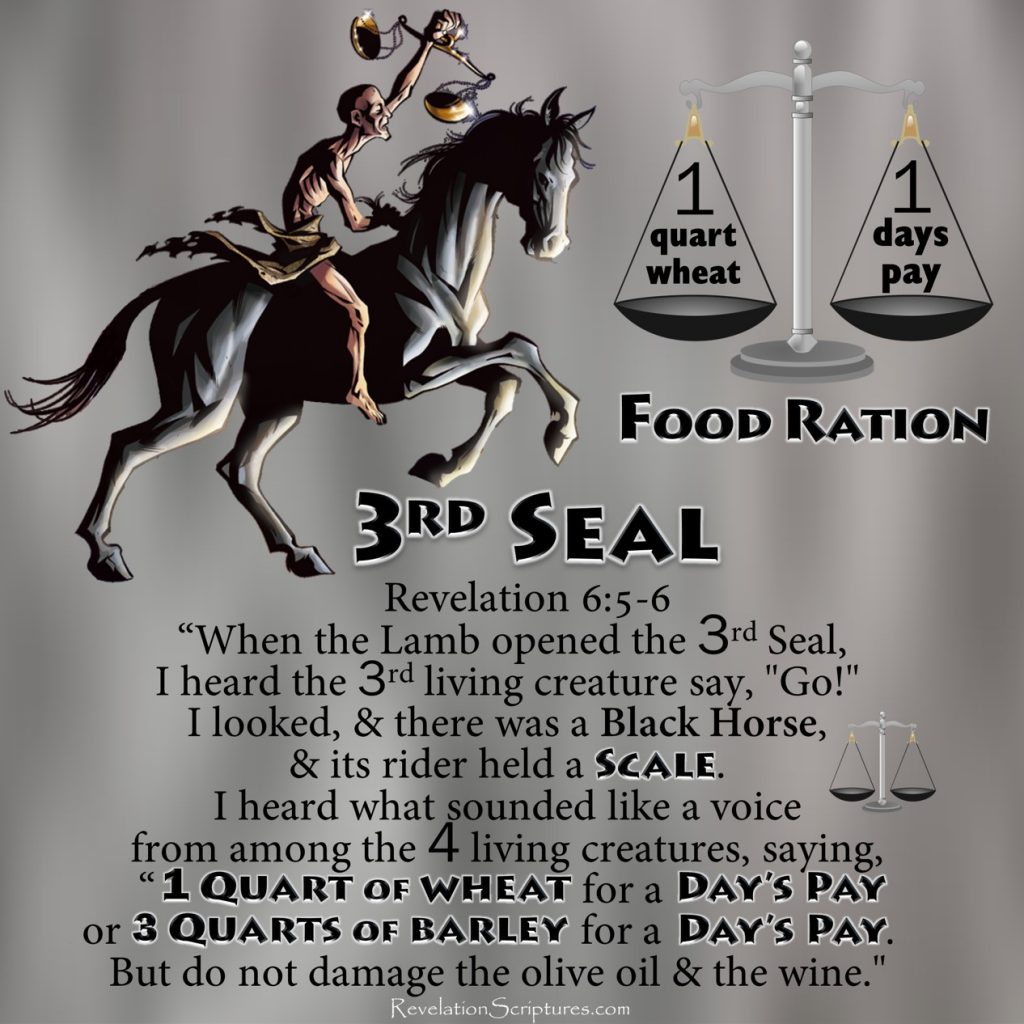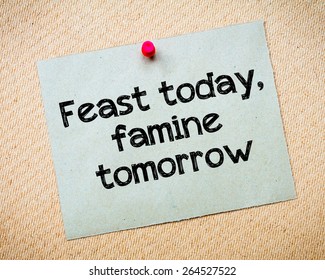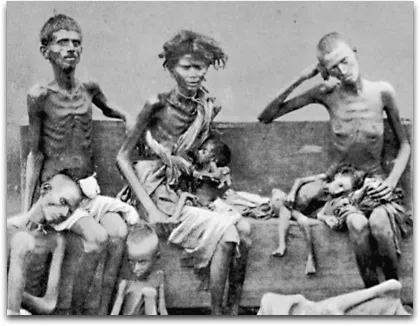"they shall eat bread by weight, and with care"
(Eze 4: 16)
"I will destroy your food supply"
(Lev. 26: 26)
"Moreover he said unto me, Son of man, behold, I will break the staff of bread in Jerusalem: and they shall eat bread by weight, and with care; and they shall drink water by measure, and with astonishment: That they may want (lack) bread and water, and be astonied one with another, and consume away for their iniquity." (Eze 4: 16-17)
Commented Dr. Gill on these verses:
"behold, I will break the staff of bread in Jerusalem: that is, take away bread, which is the staff of life, the support of it, and which strengthens man's heart; and also the nourishing virtue and efficacy from what they had. The sense is, that the Lord would both deprive them of a sufficiency of bread, the nourishment of man; and not suffer the little they had to be nourishing to them; what they ate would not satisfy them, nor do them much good; see (Leviticus 26:26 ) (Isaiah 3:1 ); and they shall eat bread by weight, and with care; that they might not eat too much at a time, but have something for tomorrow;
and consume away for their iniquity; their flesh upon them black through famine, putrid and noisome; and they wasting, pining, and consuming; reduced to skin and bones; and disagreeable to look upon; and all because of their sins and iniquities." (Commentary)
Though the famine mentioned by Ezekiel concerned
"Jerusalem" and her citizens yet it describes the famine that is coming under the black horse rider of the Apocalypse. Under the black horse rider we see wheat and barley,
"bread," being carefully weighed.
At this point in our look at the black horse rider and his judgment, we plan to address the following questions.
Questions
1. What food is scarce? What crops?
2. What "harm" or "damage" is done to these food sources and supplies?
3. What food stuffs are particularly mentioned?
4. What about the food stuffs not particularly mentioned?
5. Why the command to "damage not the olive oil and the wine"?
6. What earthly power is controlling food distribution (or the scales)?
7. What effect will the famine have on the previous murdering under the red horse?
8. How long will the bloodshed and famine last?
9. How many will die by the famine and sword?
10. Will the righteous suffer as the wicked?
Assumptions
1. People will still be working for a day's supply is given for a day's wage.
2. Commerce, buying and selling, will still be occurring.
3. Some authority is in control of rationing food.
4. All food crops harmed except for grapes and olives.
In the first chapter in this series on the black horse rider, I cited from Seiss. Recall his words:
"The arrival of things at such a pass, accordingly argues a severity of hard times, distress, and want, almost beyond the power of imagination to depict. Yet, it is but the natural result of the state of things under the red horse. The two are closely connected as cause and effect. Take away peace from the earth, and inaugurate universal wars, civil strifes, and bloody feuds, and terrible scarcity of the means of subsistence must follow."
As has been pointed out previously, it seems more natural for the famine to precede the civil strife and manslaughter. But, with the four horsemen, the strife precedes the famine, a thing Seiss addressed, saying that the famine is
"the natural result of the state of things under the red horse." We also observed, however, that Seiss has also been cited as affirming that the first four seals are opened rapidly, each seal being opened immediately upon the opening of the others, so that the effect is that the four horsemen may be said to appear together.
We also observed how it is likely that the judgment of each horse rider continues along with the others. In other words, the bloodshed and absence of peace does not stop when the black horse rider comes, but rather
the red horse rider keeps right on riding but this time accompanied by the black horse rider.
No doubt but that the famine will in some cases increase the mutual manslaughter, people killing to steal another's supply of wheat and barley. On the other hand, when people get weak from malnutrition, they are not as able to kill another, and so there will rather be a decrease in the manslaughter.
One wonders also how the populous can still keep working, receiving their
"day's wage," when they become weak and ill. One wonders about the elderly, the disabled. Will they be denied a day's supply of food because they are not working? Will it be a case of
"lifeboat ethics"? More on that later.
It seems clear that the coming of the white, red, and black horse riders, with their judgments, acts like
"Dominoes," and/or a
"Slippery Slope," where things go
"spiraling" out of control. There is, in the coming judgments of the Apocalypse, beginning with the four horsemen, a chain of events that, once initiated, cannot be halted.
The Food Supply
The foods specifically mentioned are wheat, barley, wine, and oil (probably olive oil). There is no mention of meat nor of fruits and vegetables other than grapes and olives. No other grains are mentioned, such as oats, rice, sorghum, millet, rye, etc.
It seems unlikely that it is only wheat and barley that are harmed or damaged by the judgment of the black horse rider. The words
"harm not the wine and oil" imply that all other crops are harmed. Everything is harmed except the vine and olive tree. If wheat and barley are in scant supplies, then so it is likely other grains, fruits and vegetables, will also be
"harmed" or
"damaged."
We know that there are several causes for the famine. In one sense, it is the sin of the world. In another sense, it is the judgment act of God. But, what second causes are there? What means does the Lord use to damage the food supply? Drought? Civil chaos?
The food supply has often been an object of God's wrath when punishing sinners. In the long ago the Lord warned the Israelites:
“And if, in spite of all this, you still disobey me, I will punish you seven times over for your sins. 19 I will break your proud spirit by making the skies as unyielding as iron and the earth as hard as bronze. 20 All your work will be for nothing, for your land will yield no crops, and your trees will bear no fruit. 21 “If even then you remain hostile toward me and refuse to obey me, I will inflict disaster on you seven times over for your sins. 22 I will send wild animals that will rob you of your children and destroy your livestock. Your numbers will dwindle, and your roads will be deserted. 23 “And if you fail to learn the lesson and continue your hostility toward me, 24 then I myself will be hostile toward you. I will personally strike you with calamity seven times over for your sins. 25 I will send armies against you to carry out the curse of the covenant you have broken. When you run to your towns for safety, I will send a plague to destroy you there, and you will be handed over to your enemies. 26 I will destroy your food supply, so that ten women will need only one oven to bake bread for their families. They will ration your food by weight, and though you have food to eat, you will not be satisfied. 27 “If in spite of all this you still refuse to listen and still remain hostile toward me, 28 then I will give full vent to my hostility. I myself will punish you seven times over for your sins. 29 Then you will eat the flesh of your own sons and daughters. 30 I will destroy your pagan shrines and knock down your places of worship. I will leave your lifeless corpses piled on top of your lifeless idols,[a] and I will despise you. 31 I will make your cities desolate and destroy your places of pagan worship." (Lev. 26: 20-31 NLT)
Though these curses and punishments are threatened against Israel for her disobedience to the Sinai Covenant yet they are applicable to all men in that all men have covenant obligations to render faith and allegiance to their Creator. In this description of God's judgment he threatens the
"food supply." It is the same kind of judgment upon the food supply that is coming at the time of the black horse rider.
Notice that more than once, due to the increased disobedience of the people (or as the Lord says,
"for your sins") and for their continued refusal to repent, the Lord promises to increase the severity of the judgments
"seven times over."
The Lord says that he will be
"hostile" (or furious) towards the rebellious Israelites, to
"give full vent to my hostility (fury)" This is in keeping with what we observed in previous chapters about God being cruel, terrible, severe, etc.
The Lord will employ
"armies" who will
"carry out" or execute
"the curse," which curse includes devastation to the food supply. Recall that we have already referred to the various locust
"armies" sent by God to destroy the crops, via the prophecy of Joel. Further, as we have observed, the white horse rider refers to the coming of Christ in judgment, and so the red, black, and pale horses are but agents of the judgments determined and executed by Christ, and each of these three calvary riders may be viewed as generals who are in charge of other heavenly angels who will help to bring about the calamities described.
Hard Lessons For The Evil World
"Yea, in the way of thy judgments, O Lord, have we waited for thee; the desire of our soul is to thy name, and to the remembrance of thee. With my soul have I desired thee in the night; yea, with my spirit within me will I seek thee early: when thy judgments are in the earth, the inhabitants of the world will learn righteousness." (Isa. 26: 8-9)
What are the judgments of the four horsemen designed to teach the Omega wicked generation? What lessons does the Lord want the inhabitants of the earth to "learn" by these awful judgments of the Apocalypse? Further, do they accept the teaching God is giving them? Or, do they rebel against it?
On the above words of the prophet, Barnes said:
"the punishments which he inflicted were intended to lead people to learn righteousness...Learn righteousness - The design is to warn, to restrain, and to reform them." (Commentary)
Wrote John Calvin:
"The inhabitants of the earth will learn righteousness. We must observe the reason assigned, when he says that “the inhabitants of the earth learn righteousness from the judgments of God,” meaning that by chastisements men are taught to fear God. In prosperity they forget him, and their eyes are as it were blinded by fatness; they grow wanton and petulant, and do not submit to be under authority; and therefore the Lord restrains their insolence, and teaches them to obey. In short, the Prophet confesses that he and others were trained, by God’s chastisements, to yield submission to his authority, and to intrust themselves to his guardianship; because if God do not, with uplifted arm, claim his right to rule, no man of his own accord yields obedience." (Commentary)
These comments are in keeping with what we have observed about the wicked prosperity of the very last days and of the judgments that shall come upon it. The prophet's words tell us, in so many words, that "God’s judgments are the best schoolmasters." (John Trapp commentary) But, as we will see, the Omega generation will be most hardened in their sins and enmity against God and his Christ, and rather than reforming or repenting of their wicked behavior, they rather curse and blaspheme God who they finally recognize is sending these awful calamities of judgment.
Wrote another:
"For when thy judgments are in the earth, the inhabitants of the world will learn righteousness: and good reason it is that we should thus desire and seek thee in the way of thy judgments, because this is the very design of thy judgments, that men should thereby be awakened to learn and return to their duty; and this is a common effect of them, that those who have been careless in prosperity, are made wiser and better by afflictions." (Matthew Poole's English Annotations on the Holy Bible)
But why does God visit us with judgments? Not that He delights in the miseries of His creatures. “He afflicteth not willingly, nor grieveth the children of men.” He would rather “draw them by the cords of love”; and “by His goodness lead them to repentance.”
It is, as we have observed, it is in order that God uproot unrighteousness and in justice judge the world.
God's Lesson To Omega Man
"Jesus answered, “It is written: ‘Man shall not live on bread alone, but on every word that comes from the mouth of God.’” (Matt. 4: 4)
This is one lesson the Lord intends to teach the Omega generation!
The bible teaches that it is God "who supplies seed to the sower and bread for food." (2 Corinthians 9:10 NIV) It teaches that "he gives to all life, and breath, and all things." (Acts 17: 25)
The Lord warned by Moses:
"But thou shalt remember the LORD thy God: for it is he that giveth thee power to get wealth." (Duet. 8: 18)
John the Baptist taught similarly, saying:
"A man can receive nothing, except it be given him from heaven." (John 3: 27)
But, this is a truth that man has forgotten. For, like Israel, the creature has "forgotten his Maker" (Hosea 8: 14) Not only is he not thankful to his Creator, he actually is at war with him. This is why fallen man is called a "rebel" in scripture. Yet, the Lord warns:
"If you are willing and obedient, you will eat the good things of the land; but if you resist and rebel, you will be devoured by the sword.” For the mouth of the LORD has spoken." (Isa. 1: 19-20)
When the red and black horse riders appear, then masses around the world will be "devoured by the sword" and will not any longer "eat the good things of the land." And why? Because the world will be full of "rebels" who "resist" God, who are unwilling and disobedient.
The World's Reaction
"And the rest of the men which were not killed by these plagues yet repented not of the works of their hands, that they should not worship devils, and idols of gold, and silver, and brass, and stone, and of wood: which neither can see, nor hear, nor walk: Neither repented they of their murders, nor of their sorceries, nor of their fornication, nor of their thefts." (Rev. 9: 20-21)
Throughout the varied judgments of the coming Apocalypse we are sometimes told of the reaction that these judgments are having upon the wicked inhabitants of the earth. The above is the first. Though it is mentioned only in chapter nine, yet it truly characterizes the reaction of the people up to that time and must include the reaction of the earth's peoples under the calamities of the four horsemen. Notice that it is repeated that they did not "repent." They kept right on doing those things that were the cause of the judgments. Though the judgments are designed to teach the people their errors and to teach them the way of salvation and righteousness, yet the people are bad students, failing to get the lesson. They do not react as the Ninevites, who repented in sackcloth over the announced doom that the prophet brought to them from the Lord.
"And men were scorched with great heat, and blasphemed the name of God, which hath power over these plagues: and they repented not to give him glory...And blasphemed the God of heaven because of their pains and their sores, and repented not of their deeds...And there fell upon men a great hail out of heaven, every stone about the weight of a talent: and men blasphemed God because of the plague of the hail; for the plague thereof was exceeding great." (Rev. 16: 9, 11, 21)
Notice that this is said in chapter 16 when many more awful judgments have come on the earth. Have the people finally learned their lesson and repented? No, they rather become more hardened in their sin and rebellion against the Lord.
Notice these other statements by the sufferers of the judgments:
"And the same hour was there a great earthquake, and the tenth part of the city fell, and in the earthquake were slain of men seven thousand: and the remnant were affrighted, and gave glory to the God of heaven." (Rev.11: 13)
"Who shall not fear thee, O Lord, and glorify thy name? for thou only art holy: for all nations shall come and worship before thee; for thy judgments are made manifest." (Rev. 15: 4)
The first verse gives us some hope that some of the earth's wicked inhabitants will begin to "get the lesson," or "get the point," recognize the judgment as coming from God, and rather than blaspheming God, as others, "give glory to the God of heaven."
Several times the Lord said (Lev. 26) "if you fail to learn the lesson." It seems that the Omega generation will indeed "fail to learn the lesson."




